The Intel SSD 710 (200GB) Review
by Anand Lal Shimpi on September 30, 2011 8:53 PM EST- Posted in
- Storage
- SSDs
- Intel
- Intel SSD 710
Random Read/Write Speed
The four corners of SSD performance are as follows: random read, random write, sequential read and sequential write speed. Random accesses are generally small in size, while sequential accesses tend to be larger and thus we have the four Iometer tests we use in all of our reviews.
Our first test writes 4KB in a completely random pattern over an 8GB space of the drive to simulate the sort of random access that you'd see on an OS drive (even this is more stressful than a normal desktop user would see). I perform three concurrent IOs and run the test for 3 minutes. The results reported are in average MB/s over the entire time. We use both standard pseudo randomly generated data for each write as well as fully random data to show you both the maximum and minimum performance offered by SandForce based drives in these tests. The average performance of SF drives will likely be somewhere in between the two values for each drive you see in the graphs. For an understanding of why this matters, read our original SandForce article.
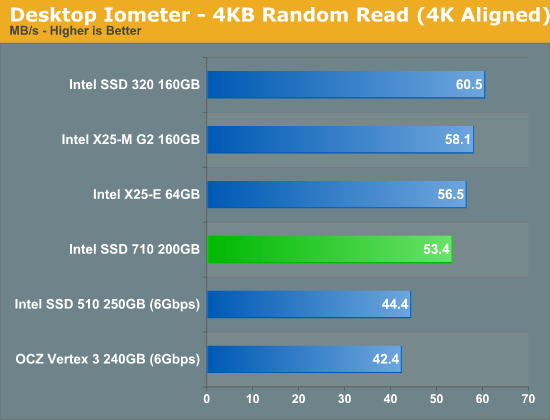
Random read performance is actually a bit behind the SSD 320 and old X25-M G2, but still within the same ballpark and comparable to the X25-E. Note that random read performance has always been a strong suite of Intel's, which is very important to many database workloads.
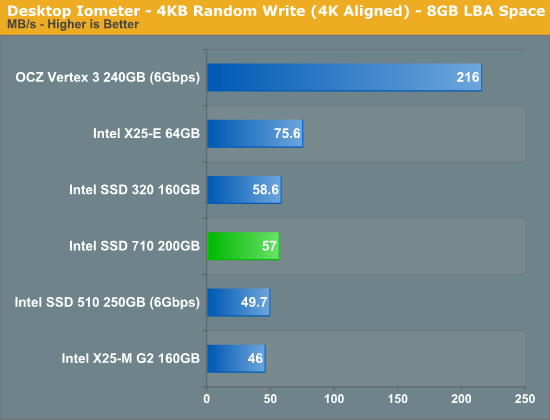
Random write performance is in the same ballpark as the other Intel MLC SSDs, however the X25-E is noticeably faster. SLC NAND is always easier to write to, and we see that advantage clearly here. Although the 710 does ok here, newer controllers from SandForce have raised the bar for highly compressible random write performance by a significant margin.
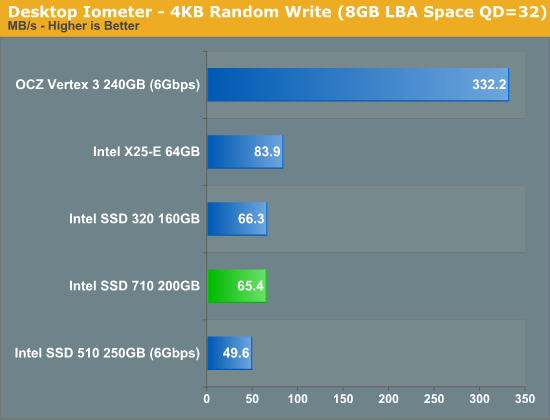
At high queue depths the X25-E is still significantly faster. Given the random nature of many enterprise server workloads, the 710 could end up slower than the X25-E.
Sequential Read/Write Speed
To measure sequential performance I ran a 1 minute long 128KB sequential test over the entire span of the drive at a queue depth of 1. The results reported are in average MB/s over the entire test length. These results are going to be the best indicator of large file copy performance.
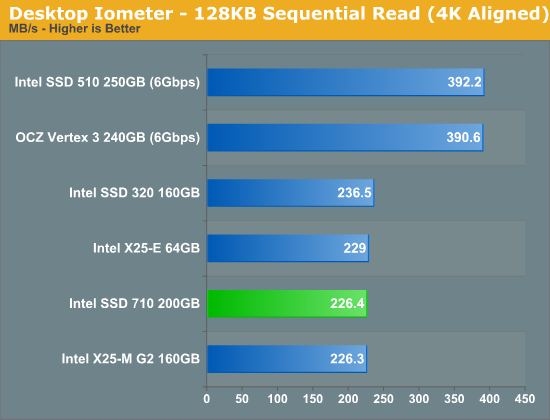
Sequential speed is also quite similar to other Intel drives. Note the slight drop in performance compared to the SSD 320. With the type of workloads the 710 is aimed at, I don't expect large file sequential performance to be a limiting factor. Once again we see that newer 6Gbps controllers from Marvell and SandForce offer much better performance here.
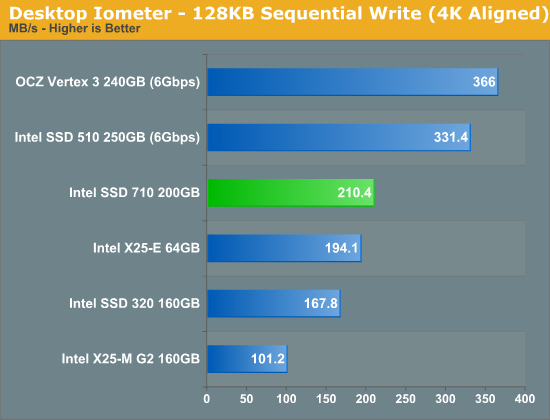
Sequential write performance is up quite a bit over the previous generation drives. The additional spare area is part of the story here, though the 6Gbps controllers still maintain their lead.










68 Comments
View All Comments
Lifted - Friday, September 30, 2011 - link
If you're going to wear a t-shirt without a jacket, at least have something geeky/nerdy on it. ;)METALMORPHASIS - Friday, September 30, 2011 - link
After buying one of these drives all you can wear is just a plain t-shirt.EJ257 - Saturday, October 1, 2011 - link
Yeah like a t-shirt that say "I Void Warranties"http://www.thinkgeek.com/interests/techies/8f52/
michal1980 - Saturday, October 1, 2011 - link
PM your addy, and I'll send you a tee shirt that has a new collar. yours is stretched out.ph0masta - Saturday, October 1, 2011 - link
I'm not in the IT biz, yet as a computer tech enthusiast I still find it interesting. I'd to learn more about the high performance warez that are required to run enterprise class computing.dananski - Monday, October 3, 2011 - link
Stop going off topic, this is clearly about T-Shirts. :PLinkpl4y - Saturday, October 15, 2011 - link
I wonder if you could fry an egg on an SSD.http://www.foodrepublic.com/2011/10/14/how-fry-egg...
AdamK47 - Friday, September 30, 2011 - link
This is a good review, but are SSD reviews going to be the only interesting thing for the PC builder/overclocking community to view? You know, the foundation of which AnandTech was build on. I remember all of the great reviews for 7+ years ago. If it weren't for the forums, I really wouldn't be here still. Where are the Sandybridge-E previews or the Bulldozer previews? How about some good old fashioned overclocking analysis? Throw in some good gaming benchmarks while you're at it. I couldn't care less about business IT hardware, efficient HTPC, or Apple related reviews. Is this where your analysis team has deemed the direction the site should go in?dac7nco - Friday, September 30, 2011 - link
In all fairness, IT hardware is interesting to quite a few people. There are a few places here and there that benchmark games. I agree about the Apple reviews; I couldn't care less, and neither would most sane people.B3an - Saturday, October 1, 2011 - link
I also couldn't care less for anything Apple related. But sadly Apple articles seem to get quite a lot of attention so i doubt they'll be going away. It's like everything that does well... after a while things start to get more mainstream and you cant get more mainstream than Apples useless toys. I have no problem with this review at all though, i just hope these kinda detailed reviews dont disappear.